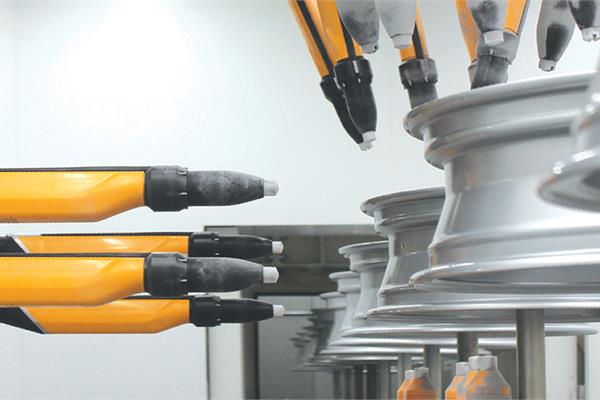
Mapsa, a part of the Corporación Mondragón, the eighth Spanish business group, provides all major OEMs with its alloy wheels: PSA Group, Opel, Seat, Volkswagen-Audi Group, Kia, and Ford. Every hour, Mapsa coats 685 alloy wheels with a turnkey plant designed and built by OLPIDÜRR S.p.A., the world competence centre for alloy wheels of the German group Dürr.
With a speed of 7.99 m/min., it is among the fastest coating lines in use in the alloy wheel industry and one of the largest in the world in terms of productivity. It was designed with an Industry 4.0-oriented approach for full traceability of wheels, each of which is matched with its actual process parameters. It is also equipped with innovative solutions to solve the typical and unique problems of wheel coating processes, now intensified by the industry's strict specifications, such as wheel shape, paint thicknesses, presence of surface areas not to be coated, oven temperature control profiles, temperature at the exit from coolers, and soft wheel grip during transfer among synchronised circuits. These are just some of the features of the turnkey plant designed and built by Olpidürr (Milan, Italy), the world competence centre for alloy wheels of the German group Dürr, and installed by the Spanish cooperative Mapsa (Pamplona, Spain) in 2018. With a productivity of almost 700 alloy wheels per hour – 685, to be precise – this is an imposing plant, built in the framework of the expansion of the already existing paintshop. "Conceiving an optimal layout with the space and material flow constraints imposed by Mapsa was the first challenge faced already in the offer phase," says Flavio Bodini, the Sales Manager for the wheel sector at Olpidürr.
The line is arranged on three levels, with five synchronised conveyors; a robotised loading station and a continuous flow unloading station sending the parts to the inspection and final check lines; two identical powder primer application booths; two booths applying liquid base coats and clear coats and overlooking an air-conditioned clean room; ovens and coolers for each process phase; a Dürr Ecopure TAR recovery afterburner with a capacity of 25,000 Nm3/h, i.e. the largest in Dürr's range, to purify the air exiting the liquid coating booths, the flash-off units, and the cross-linking oven; auxiliary systems and devices including chemical-physical water treatment, demineralised water production, and coating sludge separation units.
This line was designed in compliance with the principles of Industry 4.0, i.e. with a supervision system that, in addition to managing and controlling all machines, allows full traceability of each wheel, which is identified by a Datamatrix code reader during loading so as to uniquely match it with its process parameters when passing through the individual sections of the system.
Currently, the plant is in the ramp up phase, ready to handle the increasing production volumes of Mapsa, one of the leading companies in the European automotive sector.
Keep Reading